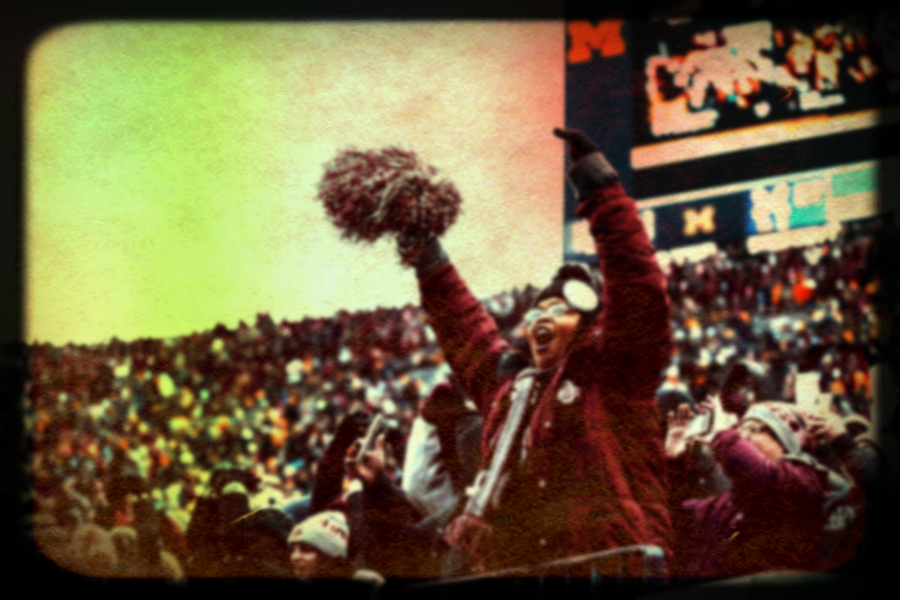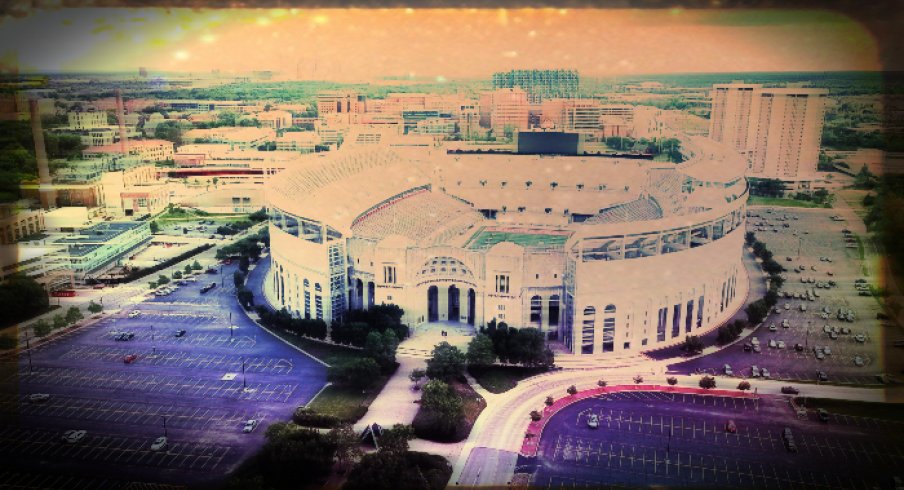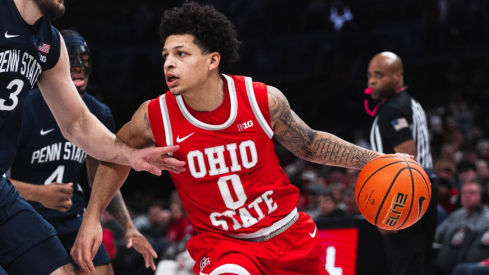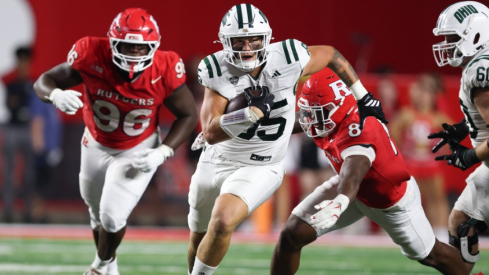My first memory of feeling American was at a Big Ten football game.
It was the first time I had been in a place with so many people, so close together. Everyone was shouting and singing and cheering and clapping. People stood even though they had seats.
I had to stand on the bench just so I could see parts of the field between the shoulders of all those adults. I couldn't see anything in church when the adults stood up (and they stood up a lot!) but I didn't really care on Sundays. I decided then and there I wanted to see everything on Saturdays. I loved how it felt.
Energy like this had eluded me. I had discovered college football as a 1st grader, about a year after I kind of figured out how to think and speak in American English instead of a hot French-and-Arabic mess everyone but my immigrant parents struggled to interpret.
The live college football experience was an entirely new language for me. This is good, I thought. This is better than good. I never want to miss this. And four decades later, I still haven't. It has been my culture, through triumph and scandal, no matter how bad the team or problematic the system was.
I have thought about college football every day of my life since then. There is no offseason.
The America without a college football season included no automobiles.
Penicillin was a myth, Civil War veterans were not only alive but still virile and we only had, like, 40 states. You were lucky to live to see 50 the last time we didn't have a season.
Not even Carmen Ohio accommodates for what we are tolerating in 2020, and it was penned in 1902 while we were still figuring out what was causing Yellow Fever. Michigan won the Rose Bowl that year. Air conditioning didn't exist. It wasn't a great world! And yet:
These jolly days of priceless worth
By far the gladdest days on earth
Soon will pass and we not know
How dearly we love Ohio
We should strive to keep thy name
Of fair repute and spotless fame
So in college halls we'll grow
And love thee better ... OHIO!
Actually being allowed in college halls while losing to Michigan by 86 points. A mixed bag, for sure.
Campus stadiums will be empty across the country this fall. Schools that have already reopened are quickly learning they're basically moored cruise ships as far as this virus is concerned. We still have no cohesive plan to end this nightmare other than hoping it leaves us alone.
Some schools will attempt to play a sport dominated by minorities and the clinically obese while an extremely contagious disease that adversely impacts exactly those people is raging. Containing what's coming will be extraordinarily difficult, and most of America has already shown it doesn't have the endurance to allow cautious abnormality enough time to stay effective.
And still, I am struggling with the urgency the B1G had for shutting it all down yesterday, nor do I want to think about what its leadership has (hasn't) done over the past several months that turned this week into a fire drill.
Some schools will attempt to play a sport dominated by minorities and the clinically obese while an extremely contagious disease that adversely impacts exactly those people is raging.
There was never a deliberate plan for saving football, only crossed fingers. Even after we lost March Madness (!) the public wasn't provided with metrics or stated goals for every institution and fall sports stakeholder to monitor and help chase. There was a hashtag, but no one gives a solitary shit about hashtags. If there were designs on how a plan would quantifiably succeed, we never saw them.
No carrot, only sticks. This is bad. This is worse than bad. I hate this language.
We've been up against invisible, cunning enemies before. On Sept 12, 2001 once the shock cleared enough to compose a lucid thought, I did not think football would resume that season. I believed city-sized buildings like Ohio Stadium were all basically giant targets that would never operate normally again. Eight days later I was on a 757 to Los Angeles.
Ten days later I was inside the Rose Bowl with 74,000 other people. We've lost 104 Americans, in America, to jihadist terrorism since 9/11. We lost 1,334 Americans in America to COVID-19 yesterday.
Normal simply evolved into something different after 9/11. I have believed since the NCAA Tournament was lost to the pandemic that a solution to keep major college football intact for 2020 not only existed, but was tenable and could exceed expectations - except it would require the tacit admission that student-athlete in an industry that generates billions of dollars is not 100% bullshit, but like 88% bullshit.
Wealth hoarders like B1G and Pac 12 institutions could easily afford this solution, which follows what professional sports leagues have already done by cordoning off everyone involved for the season to save the moneymaker that pays all the bills.
But doing so would end the amateurism myth. Virtual learning with in-person football is special treatment far beyond what accompanies varsity sports participation. The NCAA's pale white ass would be on full display.
A coronavirus one-year vacation from pretending amateurism is legitimate would unbake the NCAA's cake permanently and call for base compensation, benefits and other considerations for college athletes beyond tuition and cost of attendance. A collegiate player's union would form, and collective bargaining is a well-studied and effective instrument. Wealth hoarders know this. That's why they hate it.
The NCAA showed through the O'Bannon lawsuit that it wasn't interested in any other normal besides the one it has enjoyed since its inception. A one-year grace period could not happen. No tag-backs barely works in an actual game of tag, let alone when there are billions of dollars that could be spread even slightly more equitably.

Sports are the reward for a functional society has made the rounds during our chaotic pandemic response, and it's mostly true. Protective bubbles in a dysfunctional society are ways to cheat sports into survival, and amateurism lives at the crossroads of that possibility. A competent and cohesive pandemic response would have protected the NCAA's normal, and it appears its strategy of crossing its fingers was based on a functional society coming to its rescue.
As for a functional society, we cannot seem to agree on anything except that we love sports. We cannot agree on the severity of the disease, we cannot agree on the measures to reduce transmission or risk, we cannot agree on the information surrounding the pandemic and we cannot agree on who or what is at fault. The same people who have questioned or refused to support anti-virus efforts all along are now imploring schools to open and teams to play.
We cannot agree on anything that matters from contagion to amateurism and just about everything in between, and that's why college sports are slipping away from us. The consequences of taking America's flawed but functional systems for granted are now killing things we deeply care about that few ever considered to have a broader connection outside of fall Saturdays.
And this will not fix itself. The NCAA punted to fall after it canceled March Madness, and now the B1G is punting from fall to spring while hoping for functional society to come to its rescue. COVID has no idea what the day on the calendar is. The only thing it knows how to do is hop from host to host, quietly lurk for a little bit, and then destroy whatever it can.
It had no inkling or clue that it could kill a football season And COVID didn't. People did that.
I met my future wife at the Varsity Club on a College Football Saturday during one of the worst Ohio State football seasons of the past 50 years, a season I would relive right now without bargaining.
I wasn't supposed to be on campus. I had flown to Columbus for a wedding, and that morning I freaked out and ghosted it, ranking me among the worst wedding guests on record. RSVP'd and just didn't show up. Met a lady instead. Made a family. I can tie that fateful event to my first memory of feeling American, standing on my toes on a bench to try and see the field in the gaps between the hulking adults blocking my view.
The sport has shaped my identity. My command of American English is pretty good now, and it's largely because I've forced myself to write about college football for what's now going on a third decade. This stopped being a hobby a long time ago.
This year I've learned how to write about college football in the absence of college football. It appears I'm going to have to get better at that, quickly. Not having B1G football is not just a minor inconvenience or a sad thing for me. It's part of my wiring. Without it, I don't know who this person is.
I don't know what kind of impact the next version of normal is going to have on who I am, but I hope I like it as much as I hate this. And when the Buckeyes take the field again, I hope we remember how important everyone is in upholding a functional society. There can never be another offseason for that.



